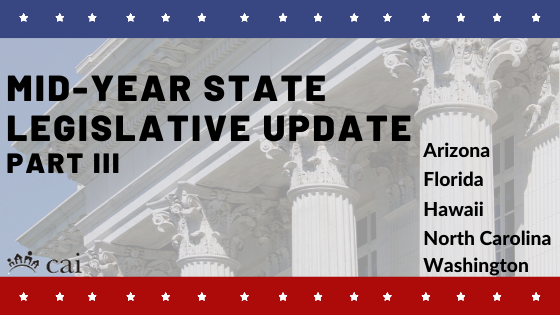During the COVID-19 pandemic, CAI’s legislative action committees (LACs) volunteered hundreds of hours reviewing bills, drafting testimony, working with lobbyists, meeting with legislators and other decision-makers, and testifying for and against bills.
Here is the third part of our series focusing on legislative issues impacting the community association housing model.
Arizona
The Arizona Legislative Action Committee reviewed dozens of bills that had an impact on community associations. Three priority bills included:
- S1001: Regulating an HOA and condominium association payment coupon books and statement of accounts. Status: Failed
- S1412: Restricting planned community’s ability to prohibit or unreasonably restrict a unit owner or member’s ability to peacefully assemble or use private or common elements of a community if done in compliance with reasonable restrictions for the use that property adopted by the board of directors. Status: Failed
The Arizona LAC and Alexis Glascock, a lobbyist, worked tirelessly to defeat these measures.
Florida
As a state with one of the most burdensome regulatory systems for community associations, the Florida Legislative Alliance (FLA) and lobbyist Travis Moore worked diligently promoting legislation to help associations. This year, FLA successfully advocated to pass several bills positively impacting the community association housing model.
- SB 1084 Emotional Support Animals: The bill further regulates the current system pertaining to emotional support animals to comply with the newly released emotional support animal guidelines from the Department of Housing and Urban Development. Status: Passed. This law took effect on July 1.
- SB 374 Discriminatory Covenants: This anti-discrimination bill creates a simple process for a community association board of directors to remove discriminatory covenants by a board vote. Status: Passed. Awaiting Governor’s signature. Over the last few years, several states passed legislation deeming archaic discriminatory language in association covenants to be unenforceable and declared null and void. Florida joined this initiative through legislation directly aligning with CAI’s public policy on removing discriminatory restrictive covenants.
- HB 1011/SB 1128 Rentals: These bills would force community associations to allow rentals. The LAC opposed these bills to preserve the right for community associations to self-govern and choose what is best for their neighborhoods. Status: Failed.
- HB 529 Florida Insurance Guarantee Association (FIGA): The LAC supported this bill that increased the FIGA for condominium unit limits for the first time in 50 years from $100,000/unit to $200,000 to help cover costs if an association’s insurance company is unable to pay claims after a major storm. Status: Passed.
- SB 476. Law Enforcement Vehicles: The bill requires associations to allow law enforcement officers to park their vehicle in their assigned space or at their home. CAI supported the bill. Status: Passed.
Hawaii
Nearly 200 bills were introduced by Hawaii’s legislature impacting the community association housing model, covering everything from electric vehicles and fire protection to board voting and resignations, and accessory dwelling units. Very few bills passed this session, though the two priority bills below did.
- SB 2421: The bill extends and makes permanent the statute providing for effective rules related to association foreclosures on condominiums. Status: Passed.
- SB 2524: The bill extends and makes permanent the statute providing funding for condominium mediation and, in some cases, arbitration services. Status: Passed.
North Carolina
In June, North Carolina adjourned their two-year session. The LAC, along with lobbyist Henry Jones, advocated for laws impacting community associations, including some related to COVID-19. The LAC advocated to successfully pass two bills regulating limited immunity from liability relating to COVID-19.
- HB 902: This bill mandates that owners and operators of community pools are not liable in any claim or action seeking damages for injury or death resulting from transmission of COVID-19 alleged to have resulted from the reopening of the pool in accordance with applicable executive orders of the governor. Status: Passed.
- HB 118: This bill provides that associations will not be liable as a result of ordinary negligence in any claim brought by someone who claims to have contracted COVID-19 while on HOA or condominium common areas. Status: Passed.
- SB 905: At the end of the 2020 legislative session, an amendment was inserted into a bill establishing a fee cap for statements of unpaid assessments. CAI’s public policy does not favor legislatively imposed fee caps. CAI and the LAC’s policy recognized that the preparer of the disclosure documents/resale certificates incurs expenses relating to the preparation and production of such documents and supported the right of the preparer to charge a reasonable fee for such transactions. SB 905 caps the fee for a statement of unpaid assessments to $200 and allows an expedited fee (with terms) of $100. The LAC negotiated late into the evening the night before the legislature adjourned to balance the equity of this legislation to mitigate the impact on CAI members. Status: Passed.
Washington
The Washington state LAC, with lobbyists Kathryn Hedrick and Krystelle Purkey, had a very successful 2020 legislative session and worked diligently on several high priority bills, including fining authority, accessory dwelling units, and the following:
- SB 5219 & HB 1576: The LAC defeated these harmful construction defect bills that would have restricted access to the courts and limited warranty protections for community associations. Status: Failed.
- HB 1165: The LAC worked on this legislation with the bill sponsor over the past several sessions and negotiated this balanced language encouraging low-water landscaping practices as a drought alleviation tool. This bill prohibits an association’s governing documents from regulating the installation of drought resistant landscaping or wildfire ignition resistant landscaping if the property is located within the geographic designation of an order of a drought condition. Status: Passed.
View part II of CAI’s state legislative update series on Alabama, Indiana, Minnesota, and Missouri.
View part I of CAI’s state legislative update series on Connecticut, Maine, Maryland, South Carolina, and Virginia.
View more information on what is happening or happened in your state during the 2020 legislative session.



